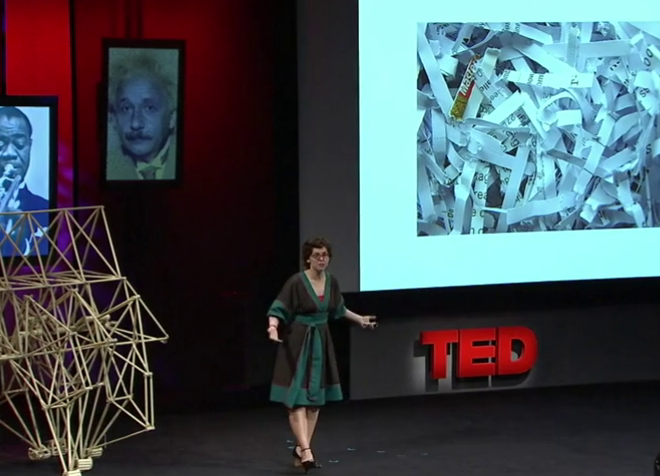So, if you have a ham butt problem, and you're thinking about the ham butt problem,
所以如果你知道火腿屁股这事儿,而你又正在考虑这个问题,
the conclusion that it leads you to is inexorable and counterintuitive: paper is the enemy of words.
它引向的结论是决绝又有违直觉的:纸张是文字的敌人。
How can this be? I mean, I love books. I really love books.
怎么可能?我爱书,非常的爱书。
Some of my best friends are books.
我的一些最好的朋友就是书。
But the book is not the best shape for the dictionary.
但是书本并不是字典最好的载体。
Now they're going to think "Oh, boy. People are going to take away my beautiful, paper dictionaries?"
有人会疑惑:“不要吧,人们不是要把优美的纸质字典拿走吧?”
No. There will still be paper dictionaries.
不是。纸质的字典还是会存在的。

When we had cars -- when cars became the dominant mode of transportation,
当我们有了车,当车成了主要的交通工具,
we didn't round up all the horses and shoot them.
就不见得要把所有的马匹都毙了。
You know, there're still going to be paper dictionaries,
纸质的字典还是会存在的,
but it's not going to be the dominant dictionary.
只是不会再是主要的载体了。
The book-shaped dictionary is not going to be the only shape
书本形式的字典不将是唯一形式的字典,
dictionaries come in. And it's not going to be the prototype for the shapes dictionaries come in.
而且不会是将来字典的原型。
So, think about it this way: if you've got an artificial constraint,
设想一下,如果你有人为的制约,
artificial constraints lead to arbitrary distinctions and a skewed worldview.
这种制约就会引致一个武断的区分和一个倾斜的世界观。
What if biologists could only study animals that made people go, "Aww." Right?
如果生物学家只研究人们喜欢的动物,对吧,
What if we made aesthetic judgments about animals,
如果我们以审美角度来判断动物,
and only the ones we thought were cute were the ones that we could study?
只研究我们觉得可爱的动物,这会怎样?
We'd know a whole lot about charismatic megafauna, and not very much about much else.
我们就只能了解那些有魅力的大群落,对其它的物种就不太了解了。
And I think this is a problem. I think we should study all the words,
我认为这是一个问题。我们应该研究所有的词,
because when you think about words, you can make beautiful expressions from very humble parts.
因为使用词可以创造出美丽的表达,即使是从非常卑下的部分。



